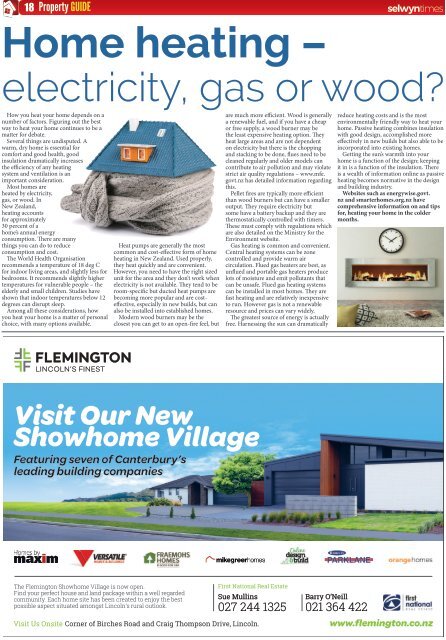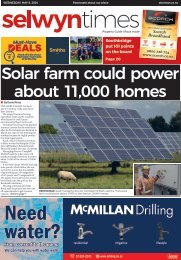Selwyn Times: April 24, 2019
You also want an ePaper? Increase the reach of your titles
YUMPU automatically turns print PDFs into web optimized ePapers that Google loves.
2<br />
18<br />
[Edition datE]<br />
Home heating –<br />
electricity, gas or wood?<br />
How you heat your home depends on a<br />
number of factors. Figuring out the best<br />
way to heat your home continues to be a<br />
matter for debate.<br />
Several things are undisputed. A<br />
warm, dry home is essential for<br />
comfort and good health, good<br />
insulation dramatically increases<br />
the efficiency of any heating<br />
system and ventilation is an<br />
important consideration.<br />
Most homes are<br />
heated by electricity,<br />
gas, or wood. In<br />
New Zealand,<br />
heating accounts<br />
for approximately<br />
30 percent of a<br />
home’s annual energy<br />
consumption. There are many<br />
things you can do to reduce<br />
consumption and cost.<br />
The World Health Organisation<br />
recommends a temperature of 18 deg C<br />
for indoor living areas, and slightly less for<br />
bedrooms. It recommends slightly higher<br />
temperatures for vulnerable people – the<br />
elderly and small children. Studies have<br />
shown that indoor temperatures below 12<br />
degrees can disrupt sleep.<br />
Among all these considerations, how<br />
you heat your home is a matter of personal<br />
choice, with many options available.<br />
Heat pumps are generally the most<br />
common and cost-effective form of home<br />
heating in New Zealand. Used properly,<br />
they heat quickly and are convenient.<br />
However, you need to have the right sized<br />
unit for the area and they don’t work when<br />
electricity is not available. They tend to be<br />
room-specific but ducted heat pumps are<br />
becoming more popular and are costeffective,<br />
especially in new builds, but can<br />
also be installed into established homes.<br />
Modern wood burners may be the<br />
closest you can get to an open-fire feel, but<br />
are much more efficient. Wood is generally<br />
a renewable fuel, and if you have a cheap<br />
or free supply, a wood burner may be<br />
the least expensive heating option. They<br />
heat large areas and are not dependent<br />
on electricity but there is the chopping<br />
and stacking to be done, flues need to be<br />
cleaned regularly and older models can<br />
contribute to air pollution and may violate<br />
strict air quality regulations – www.mfe.<br />
govt.nz has detailed information regarding<br />
this.<br />
Pellet fires are typically more efficient<br />
than wood burners but can have a smaller<br />
output. They require electricity but<br />
some have a battery backup and they are<br />
thermostatically controlled with timers.<br />
These must comply with regulations which<br />
are also detailed on the Ministry for the<br />
Environment website.<br />
Gas heating is common and convenient.<br />
Central heating systems can be zone<br />
controlled and provide warm air<br />
circulation. Flued gas heaters are best, as<br />
unflued and portable gas heaters produce<br />
lots of moisture and emit pollutants that<br />
can be unsafe. Flued gas heating systems<br />
can be installed in most homes. They are<br />
fast heating and are relatively inexpensive<br />
to run. However gas is not a renewable<br />
resource and prices can vary widely.<br />
The greatest source of energy is actually<br />
free. Harnessing the sun can dramatically<br />
reduce heating costs and is the most<br />
environmentally friendly way to heat your<br />
home. Passive heating combines insulation<br />
with good design, accomplished more<br />
effectively in new builds but also able to be<br />
incorporated into existing homes.<br />
Getting the sun’s warmth into your<br />
home is a function of the design; keeping<br />
it in is a function of the insulation. There<br />
is a wealth of information online as passive<br />
heating becomes normative in the design<br />
and building industry.<br />
Websites such as energywise.govt.<br />
nz and smarterhomes.org.nz have<br />
comprehensive information on and tips<br />
for, heating your home in the colder<br />
months.<br />
Visit Our New<br />
Showhome Village<br />
Featuring seven of Canterbury’s<br />
leading building companies<br />
The Flemington Showhome Village is now open.<br />
Find your perfect house and land package within a well regarded<br />
community. Each home site has been created to enjoy the best<br />
possible aspect situated amongst Lincoln’s rural outlook.<br />
First National Real Estate<br />
Sue Mullins<br />
027 <strong>24</strong>4 1325<br />
Visit Us Onsite Corner of Birches Road and Craig Thompson Drive, Lincoln.<br />
Barry O’Neill<br />
021 364 422<br />
www.flemington.co.nz


















